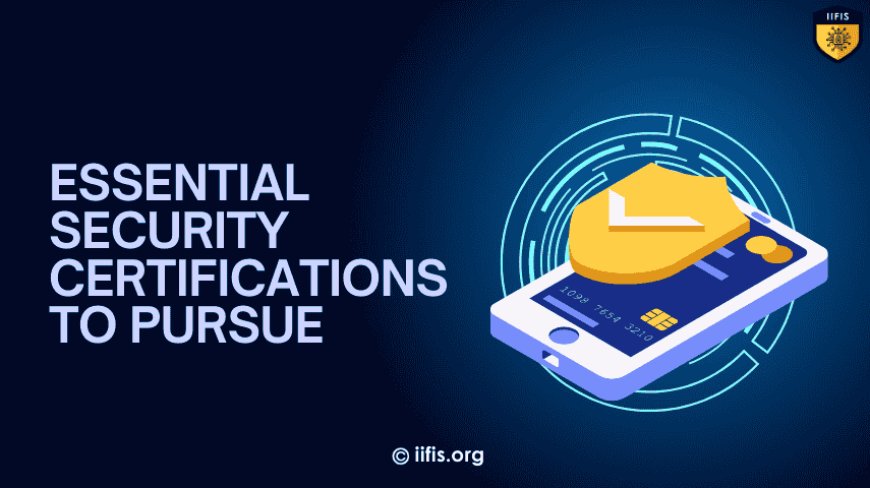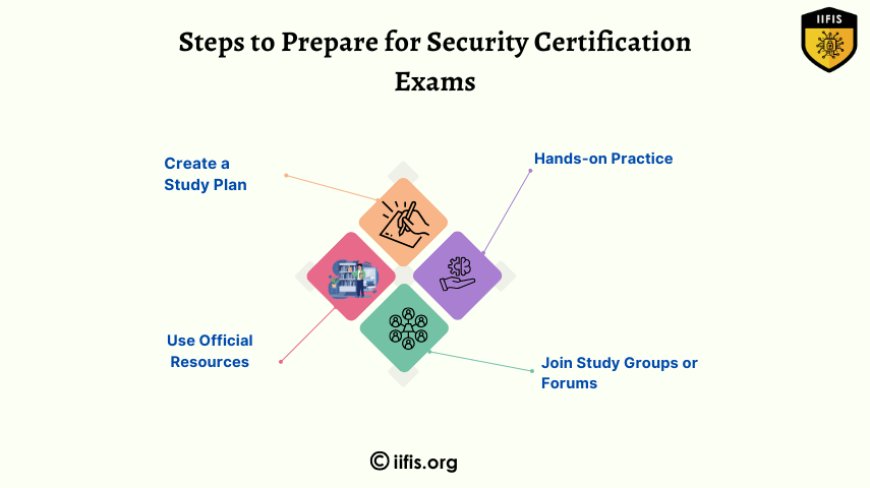Essential Security Certifications to Pursue
Explore essential security certifications to boost your career in cybersecurity. Learn about top certifications, their benefits, and how they can help you gain skills in data protection, ethical hacking, cloud security, and more.

Cyber threats are becoming more frequent and advanced, having the right security certifications can set you apart in the job market and equip you with valuable skills to protect information systems. For students and professionals new to cybersecurity, certifications are an effective way to gain specialized knowledge, prove your expertise, and open doors to a variety of career opportunities in the field. From foundational credentials that cover basic principles to advanced certifications focused on specific areas, these programs not only teach you how to identify and manage security risks but also show employers you’re serious about a career in cybersecurity. Let’s explore some of the essential security certifications that can help you build a solid career path in this ever-evolving industry.
Why Pursue Security Certifications?
-
Career Advancement
-
Security certifications can significantly improve your job prospects and open up higher-paying roles. Many employers look for certified professionals because it shows a commitment to the field and specialized skills that can immediately add value to the company.
-
Skill Validation
-
Certifications validate your knowledge and skills, proving that you have the specific expertise needed in areas like network security, data protection, or ethical hacking. They act as a stamp of approval, letting employers know you have hands-on, tested knowledge in cybersecurity.
-
Industry Recognition
-
Recognized certifications come with credibility and respect within the industry. Earning certifications like CISSP or CompTIA Security+ can help you stand out and assure employers that you meet established standards in cybersecurity.
-
Staying Updated
-
The cybersecurity field changes constantly, and certifications help you stay up-to-date with new technologies, threats, and best practices. By earning certifications, you’re not only proving your current skills but also showing that you’re committed to learning and adapting in an evolving field.
Categories of Security Certifications
-
Entry-Level Certifications
-
These certifications are aimed at individuals just starting out in cybersecurity, providing foundational knowledge and skills. They cover the basics of security principles, network defense, and risk management, helping beginners build a solid understanding of the field. Examples include Certified Ethical Hacker (CEH) (Junior).
-
Intermediate/Professional-Level Certifications
-
Designed for those already working in cybersecurity who want to deepen their expertise, these certifications focus on more advanced topics like risk analysis, network protection, and threat detection. Earning one of these certifications can help professionals move into specialized roles or leadership positions. Certifications in this category include Certified Information Systems Security Professional (CISSP) and Certified Information Security Manager (CISM).
-
Advanced/Specialized Certifications
-
For senior-level professionals, these certifications focus on highly specialized areas such as cloud security, penetration testing, and security management. They are intended for those with extensive experience who are looking to specialize further or lead security efforts within organizations. Examples include Certified Cloud Security Professional (CCSP) and Offensive Security Certified Professional (OSCP) for advanced penetration testing.
Each certification level builds on the previous one, allowing cybersecurity professionals to grow their knowledge and career over time.
Top Security Certifications to Pursue
Entry-Level Certifications
-
Certified Ethical Hacker (CEH)
-
Overview: Focuses on entry-level skills in penetration testing and ethical hacking.
-
Skills Covered: Covers ethical hacking principles, attack vectors, and penetration testing methods using a variety of tools.
-
Ideal For: Those interested in pursuing a career in ethical hacking and learning the basics of penetration testing.
Intermediate/Professional-Level Certifications
-
Certified Information Systems Security Professional (CISSP)
-
Overview: Aimed at cybersecurity professionals with advanced knowledge and experience.
-
Skills Covered: Includes risk management, security architecture, asset security, and identity management.
-
Ideal For: Mid-level to senior cybersecurity professionals looking to advance in their careers.
-
Certified Information Security Manager (CISM)
-
Overview: Geared toward the management and governance side of cybersecurity.
-
Skills Covered: Focuses on developing security programs, risk management, and incident response.
-
Ideal For: Professionals aiming to move into management or leadership roles within cybersecurity.
-
Certified Cloud Security Professional (CCSP)
-
Overview: Emphasizes cloud security, which is increasingly important in modern IT environments.
-
Skills Covered: Covers cloud architecture, data protection, and risk management within cloud platforms.
-
Ideal For: Individuals looking to specialize in securing cloud environments.
Advanced and Specialized Certifications
-
Certified Information Systems Auditor (CISA)
-
Overview: Specializes in auditing, control, and security assurance for IT systems.
-
Skills Covered: Teaches the IT audit process, governance practices, asset protection, and incident management.
-
Ideal For: Those in IT audit, control, or security assurance roles.
-
Offensive Security Certified Professional (OSCP)
-
Overview: A hands-on certification focusing on advanced penetration testing and ethical hacking.
-
Skills Covered: Includes advanced exploitation techniques, scripting, and analyzing weaknesses.
-
Ideal For: Experienced penetration testers and ethical hackers aiming to master real-world security challenges.
-
GIAC Security Essentials (GSEC)
-
Overview: A broad certification covering advanced security essentials with a strong focus on practical application.
-
Skills Covered: Topics include access control, cryptography, incident handling, and network security.
-
Ideal For: Professionals looking to build practical security skills across multiple areas of cybersecurity.
These certifications can guide professionals at different stages of their careers, helping them build expertise, stay updated, and meet the demands of various roles in cybersecurity.
How to Choose the Right Security Certification for Your Career Path
-
Define Your Career Goals
-
Start by clarifying what you want from your cybersecurity career. If you're interested in covering a wide range of security areas, a generalist certification like CISSP may suit you. However, if you're drawn to specialized fields like ethical hacking, cloud security, or auditing, look for certifications that focus specifically on those areas, such as CEH for ethical hacking or CCSP for cloud security.
-
Consider Your Experience Level
-
Different certifications are tailored to various experience levels. For beginners, entry-level certifications offer essential knowledge to get started in cybersecurity. If you have some experience and want to move up, consider intermediate certifications like CISSP. For advanced professionals, specialized certifications like OSCP provide in-depth expertise in areas like penetration testing.
-
Assess Certification Costs and ROI
-
Certifications come with different price tags, so it’s essential to balance your budget with the potential return on investment (ROI). Research average salaries for roles related to each certification to see if the potential job or salary increase justifies the cost. Many certifications can boost your earning potential, making them worthwhile investments for career growth.
-
Research Industry Requirements
-
Some industries, such as healthcare, finance, or government, may prefer specific certifications due to the unique security needs in those sectors. For example, CISM and CISSP are highly valued in industries that focus on governance and compliance, while certifications like CISA are commonly sought in IT audit roles. Understanding what’s popular in your targeted field can help guide you toward the most relevant certification.
By carefully considering these factors, you can choose a certification that aligns with your goals, fits your experience, and supports your career ambitions in cybersecurity.
Steps to Prepare for Security Certification Exams
-
Create a Study Plan: Break down topics into a study schedule based on the certification's difficulty, focusing on areas that may be challenging.
-
Use Official Resources: Rely on study guides, practice exams, and official materials to cover key topics and get a feel for the exam format.
-
Join Study Groups or Forums: Connect with others studying for the same certification to share tips, gain insights, and stay motivated.
-
Hands-on Practice: Use labs and simulations for hands-on skills, especially for certifications like CEH and OSCP, to build real-world experience.
Following these steps can help you effectively prepare for and pass your certification exam.

Benefits of Maintaining and Renewing Certifications
-
Continuous Learning
-
Renewing certifications encourages ongoing education, helping you stay current with new threats, security practices, and technologies. This keeps your skills sharp and relevant as the field evolves.
-
Career Longevity
-
In a competitive industry, maintaining certifications shows your commitment to professional growth, making you more valuable and employable over the long term.
-
Credential Validation
-
Many certifications require renewal to meet industry or employer standards. Keeping credentials up-to-date assures employers that you continue to meet recognized expertise and skill requirements in cybersecurity.
Regularly renewing certifications supports both personal growth and professional credibility in the cybersecurity field.
Cybersecurity certifications from entry-level options like CEH to advanced certifications like CISSP, OSCP, and CISM offer skills that boost job prospects, validate expertise, and open doors to specialized roles. These certifications not only help you gain knowledge in key areas like ethical hacking, cloud security, and risk management but also build credibility within the field.
As the International Institute for Information Security (IIFIS) suggests, investing in certifications aligned with your career goals is a strategic step for personal and professional growth. By pursuing certifications that match your interests and aspirations, you’re building a strong foundation for long-term success in cybersecurity. Take time to assess your career goals, choose the certifications that best suit your path, and begin your journey toward a rewarding and impactful career in cybersecurity.























